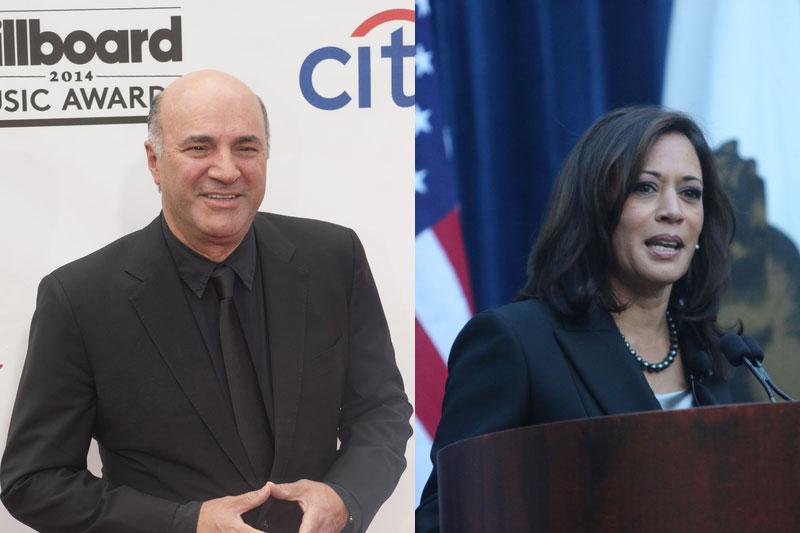Kevin O’Leary, widely recognized as “Mr. Wonderful” from “Shark Tank,” has expressed serious reservations about Vice President Kamala Harris’ newly proposed economic blueprint.
O’Leary, a seasoned entrepreneur, shared his apprehensions about the Democratic presidential candidate’s suggested economic measures on Fox News’ “Jesse Watters Primetime,” on August 19, 2024.
During a CNN interview, O’Leary took issue with several elements of Harris’ proposals, especially her initiatives to fight price gouging and her idea to offer down payment aid to first-time homebuyers. O’Leary believes these steps could lead to serious inadvertent consequences.
Harris disclosed her economic strategy at a rally on August 16, 2024, in North Carolina. Her plan encompasses a wide array of policies intended to ease financial burdens on American households. Key aspects include federal efforts to rein in grocery price gouging, tax credits for homeowners and families with children, and an ambitious target to build three million new homes over the next four years.
However, O’Leary remains skeptical about the effectiveness of these policies. Regarding price gouging, he cited the historical shortcomings of similar approaches in different countries. His doubts echo a wider skepticism among economists about the success of price controls in managing inflation without leading to shortages or black markets.
O’Leary also took on Harris’ plan to aid first-time homebuyers with a $25,000 down payment. He cautioned that in a limited housing market, this approach could fuel inflation by pushing up home prices. “When you give $25,000 to anybody in a constrained market, you cause inflation,” O’Leary noted, adding, “If there’s three houses for sale on the street and everybody bidding on it gets another $25,000, all of that attributes to the seller, and you cause the price of the house to go up because there’s no supply.”
His critique aligns with concerns raised by other financial experts who have observed that increasing demand without addressing supply constraints could lead to higher housing prices. Harris’ plan to construct three million new homes is aimed at addressing these supply issues, but O’Leary questioned its practicality. “[Real estate] is not controlled by a federal mandate; housing is state-by-state,” he contended. “She can do nothing to solve that problem. There’s no way she’s building 3 million houses. Which state is going to give her that mandate?”
The economic blueprint has been the center of attention for both advocates and critics in the past few weeks.
Supporters of Harris argue that her policies could offer much-needed relief to American families, particularly those grappling with high housing costs and soaring grocery prices.
Despite his criticisms, O’Leary expressed a wish for Harris to prosper if she were to become president.
As the discussion over Harris’s economic blueprint ensues, the stakes are high. The policies she’s suggesting could profoundly affect the U.S. economy, especially in areas such as housing and consumer prices. However, the challenges of executing such comprehensive changes, especially amidst staunch opposition, remain a significant obstacle.
O’Leary’s criticisms underscore the broader debate within the business and investment sectors about the future direction of U.S. economic policy.
Further Details on Key Elements of Harris’ Economic Plan
Harris has detailed her strategy to tackle rising grocery prices by suggesting a federal prohibition on price gouging at grocery stores. In a statement issued by her campaign, Harris drew a line between fair pricing and the excessive costs Americans have had to bear, particularly in the food and grocery sector. She highlighted that meat prices, a significant component of higher grocery bills, have skyrocketed even as meat processing companies recorded record profits post-pandemic.
Despite overall inflation decreasing to 2.9 percent for the year ending in July, grocery prices have surged by 21 percent during the Biden-Harris administration. This has led some to view Harris’ plan as an effort to connect with voters concerned about the administration’s management of inflation.
Grocery stores, operating on razor-thin margins of 1 to 3 percent, have expressed particular worry over Harris’ plan. Although Harris has not publicly addressed these margins in her price-fixing proposal, she has condemned certain grocers for unjustly hiking prices to increase profits. “A loaf of bread costs 50% more today than it did before the pandemic, and ground beef is up almost 50%,” Harris commented last Friday. “Meanwhile, many big food companies are enjoying their highest profits in two decades, and while some grocery chains pass along savings, others still do not.”
To assist American families in purchasing homes, Harris has proposed the construction of three million new housing units over the next four years. This forms part of her broader initiative to tackle the housing affordability crisis in the United States.
To incentivize the creation of affordable housing, Harris’s plan includes the “first-ever” federal tax incentive specifically aimed at building starter homes for first-time homebuyers. This incentive is designed to make it more financially feasible for developers to build lower-cost housing.
Harris also plans to expand existing tax credits for affordable rental housing, further increasing the availability of affordable living options for low- and middle-income families.
She also proposes to reintroduce the COVID-19-era child tax credit policies, which were $3,600 for qualifying children under age six and $3,000 for other qualifying children under age 18.
Harris’s blueprint includes a $35 price cap on insulin for Medicare recipients, with a $2,000 annual out-of-pocket limit extended to all Americans, not just seniors. It also proposes stricter regulations and stronger antitrust enforcement to prevent increases in consumer prices for drugs and food.











